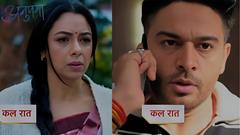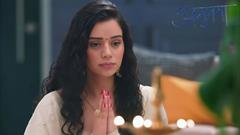"Television makes creative people a bit lazier." - Sheeja Jose
Switching careers from Television as an Executive Producer for Balaji Telefilms and Star Plus to an Assistant Director in Bollywood, the talented Sheeja Jose spills some beans about her journey in the industry...
Published: Monday,Feb 08, 2016 16:21 PM GMT-07:00

Switching careers from Television as an Executive Producer for Balaji Telefilms and Star Plus to an Assistant Director in Bollywood, the talented Sheeja Jose has an adventurous journey in the industry. While the lady recently took a sabbatical and focused on writing novels, Sheeja shares her plans of returning into the telly space with a new vision.
Let's hear Sheeja spill some beans about her journey in the industry...
Sheeja, please highlight upon your post as a channel executive.
I switched careers to TV as an Executive Producer for Balaji Telefilms and Star Plus from being an Assistant Director in Bollywood. Then I did one more show, Mano Ya na Mano as an Executive Producer and I began to write and direct episodes of the same show. TV directors hardly have any creative control of the episodes they are shooting. I cannot blame them because in India our serials run for years and decades. A director hardly gets time to read the script before the shoot! That's when I really appreciated setting up a show as a Creative Director and writer for a thriller show for 9X. The promos aired but 9X started to lose its place. Later, that production house used all the stories and episodes without paying me for a diluted version of the same show. Even today, I have no idea if they have given me credits for it. Then I went on to set up Maniben.com and Adaalat for Sony.
How taxing was your assigned responsibility back then?
Any department in Television is tedious! Actors, directors, camera crew, art department, the editing team, writers team... you name it! Everyone has to work day and night to keep the everyday episodes running. Especially the time I started in TV, we worked two-three days continuously. We ate and slept a little on the set; we showered in the vanity vans and even wore the designer clothes meant for the actors, as we hardly had time to go home. Those were my starting years.
Finally when I was working for Adaalat, the shooting time had been constrained to particular hours because of the union. Otherwise, I believe those working schedules would exist even today. Being a Creative Director, there are no fixed timings, especially when you are setting up the shows, its a 24 hours job. But when you see a new show on air, every painful and sleepless night you went through becomes worthy. I used to enjoy the challenges then.
How has the journey been and what are the pros and cons of this industry?
I had a pretty adventurous journey on Television. Luckily most of the creative directors or directors have the luxury of choice. So we could choose which producer or channel to be associated with. Television mostly pays well for the people working in it a bleak comparison to the film industry.
For me cons of the TV industry are that we are still in a premature state in terms of content. Most of the channels and production houses are scared to move away and try something new. I still have no clue how this TRP system works and where exactly this rating happens... for me it's a myth like Santa Clause coming from North Pole. I think TV makes creative people a bit lazier. They tend to go with the flow and mostly get addicted to the comfort it pays.
You are now launching a book. Please tell us more about your interest. What motivated you to dive in further into this field?
I thought I had done enough work in TV, though I hardly did some shows. I used to set up a show which normally entails 3-4 months of continuous work. Then I would take a break to sleep, eat, write and travel. My strict work ethic helped me. I always got shows whenever I came back from holidays.
Once you are a creative director, you don't have much to grow into, except becoming a producer. I tried that years back by approaching a mainstream channel with a concept. Then after six or seven months I saw the same concept from another reputed production house for the same channel. I wanted to go to court. But I realised, it takes a lot of time and money to even fight the justice system... that encouraged me to get back to movies. I wrote scripts to direct and one or another way it got delayed. Meanwhile, I wanted to use my time in a better way and I started to write a novel that is 'Goodbye Girl'.
Television has changed immensely over the years. Your viewpoint.
I disagree. I don't see much change in the TV industry even today. I never owned a TV when I was working in Television and nor do I now. It's not that I don't like TV shows. I had never developed a taste watching it. I am sure the quality of visual experience has improved today because of the technology. Reality shows shot up; otherwise contents are more or less still same in a new packaging. The only change I see, we've begun borrowing international TV content as well.
Now a days, we see a lot of channels airing shows based on supernatural. Don't you think we as an industry are trying to promote the regressive attitude of the society compared to the international formats, where the trend is moving towards experimenting new concepts?
Sadly all channels look at what is happening in other channels. Everyone in the TV industry is glued on TRP chart, which decides the fate of a show and everyone associated with that. So, one super natural shows work in one channel and eventually everyone follows the same path. If one saas bahu runs for ten years, other ten saas bahu's in different channel fairly runs for five years.
International Television tries to present distinct content which you clearly stated and we borrow many of them. Indian audience are still not ready to taste new imported concepts or it goes off air before the viewers develop the new taste. And I think we lack the path breaking content developed for Indian viewers by Indian content writers. In the west, TV is a very serious business. Their treatment from developing the content to executing them is as good as Hollywood movies. Here, more or less, we treat TV as a quick medium to survive and make some money.
It's all about who writes fast, which actors delivers dialogues faster, which director shoots more minutes, which camera man is faster, which art director charges less money and which creative director demands less creativity for the show...
Many production houses have tried rolling out finite series but the format is yet not established in India. What do you think is the reason?
As I mentioned any change takes some time to show results. It took years for people to get comfortable with the western outfits. Still in villages, they follow the traditional attire. So we can't expect them to accepting weekly shows which runs for two months when they are so used to watching same show for every single day, for years and years...
Netflix is the new talking point these days. How do you think this will change the way television is viewed currently?
Netflix took country after country by storm. So I assume they're expecting the same success here in our country too. However, it depends on the content they cater for Indian viewers. At the same time many Indian companies are also getting into this technological race. Everyone's looking for digital content, but hardly have any clarity on what they're exactly looking for. We have successful digital shows by viral fever. I have to admit, they amazed me with their content.
Digital platform still will not take away the Television viewership in a major way. It will expand the numbers of viewers as many more people who do not watch what TV offers today and who are looking for different content will be the receivers of digital platform. Because its digital, it's more or less for the youth of India at the moment. I doubt if they are the real TV viewers. So, primarily TV remains in its space and Digital platform finds its new audience adding up some from existing TV viewers. Either way it's a win-win situation. We get more choices to watch.
Lastly, any TV shows you plan to launch?
Not at the moment. I have my third book lined up and I am concentrating to getting back to movies, where I left off some time ago. But Television is always there, I have made many friends in TV in the past. I can get back to shows at any time. It will be exciting to go back to this maddening busy space once again.
Shachi Tapiawala Rathod
Your reaction
 Nice
Nice Awesome
Awesome Loved
Loved LOL
LOL OMG
OMG Cry
Cry Fail
Fail

















Comments (2)
So true. Indian shows are getting regressive day after day. And, the path breaking shows are ended as soon as they are launched and the reason given is TRPs are less. And, since the show doesn't give big bucks the CVs lose interest and start dishing out atrocious tracks. And, the result the show gets pulled off air. The channel and PH just want to make big bucks. No one is bothered about quality.
8 years ago
"TV makes creative people a bit lazier. They tend to go with the flow and mostly get addicted to the comfort it pays." That sums up the whole TV industry and their regressive shows after shows.
8 years ago